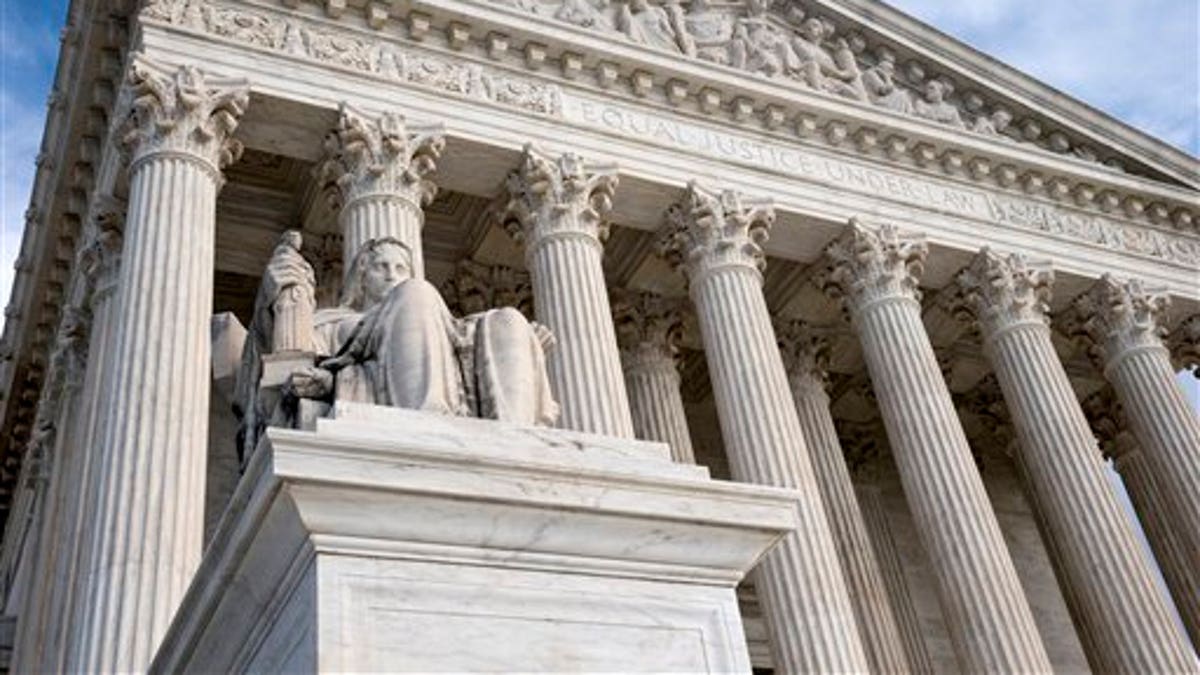
FILE: Feb. 17, 2016: The Supreme Court building, in Washington, D.C. (AP)
For over four years now, the Obama administration, through its HHS mandate, has been telling non-profit religious groups across the nation that we must participate in the distribution of abortion-causing drugs and devices to our employees. While it has changed the ways by which we are supposed to take part in this scheme, it has remained unyielding in its demand – take part or else.
We have explained to the administration over and over again that our faiths forbid complicity in evil and that taking innocent human lives is evil. We have argued that forcing us to choose between our religious beliefs and government-imposed, crippling fines violates our rights under the law. But the administration has responded only with the back of its hand.
In effect, the government has told us, “My way or the highway.”
However, the Supreme Court may have just ordered a detour.
The so-called HHS mandate is a bureaucratic regulation issued by the Department of Health and Human Services under Obamacare. It orders some religious entities – but not others – to take actions that authorize their own health care plans to offer coverage for abortifacients, contraceptives, and sterilization procedures.
Last year, the Supreme Court, in a five-to-four decision held that Hobby Lobby and other closely-held, for-profit businesses did not have to obey the HHS mandate if they objected to it on religious or moral grounds. This year, the Supreme Court is considering whether non-profit religious groups should also be free to practice their faiths. The case, which is a consolidation of seven lawsuits, is Zubik v. Burwell.
One of those seven consolidated cases was filed by the group I lead, Priests for Life. We were the first of the current Supreme Court petitioners to challenge the HHS mandate back in early 2012. Now, our efforts and those of the more than 100 other religious organizations that have filed suits against the mandate may be nearing a final result.
Of course, the tragic death of Justice Antonin Scalia has created uncertainty. Justice Scalia voted in favor of upholding Hobby Lobby’s religious rights last year. Without him, observers say, there may be a four-to-four split in the Zubik case.
But recently, about one week after hearing oral arguments in our case, the Supreme Court issued an order to both sides that may result in a victory for Priests for Life and the other petitioners. The Court ordered both sides in our lawsuit to file supplemental briefs – due today – that “address whether and how contraceptive coverage may be obtained by petitioners’ employees… in a way that does not require any involvement of petitioners….”
That the Court has asked for an explanation of these ways is greatly encouraging, for two reasons.
First, the Court is deferring to our religious beliefs. In the only stance that is proper to it, the Court is acknowledging that we, the believers, are the ones who draw the line between behavior that is acceptable or unacceptable to our religion. It is not the role of the Court or the government to draw that line for us or to second-guess our beliefs.
Second, the Court is asking us to identify a way for the government to pursue its interests in a way that is less restrictive of our religious freedom than the current "accommodation" provides.
The administration has for years argued that its "accommodation" already provides us the least restrictive means. Priests for Life and the other 36 petitioners in this case argue in the brief, however, that there are in fact ways by which our employees could receive coverage for abortifacients and contraceptives without involving the religious organizations for which they work.
And if such ways exist, then the government has failed to meet its burden under the Religious Freedom Restoration Act to use only the least restrictive means to pursue its interests. And we win the case.
If, for instance, the government or the insurance company contacts our employees independently of us, to offer the coverage by means of a truly separate plan -- rather than hijacking our own -- and if, as we insist, there is no payment, authorization, permission, or any other kind of involvement by us, then our religious freedom would not be burdened in the way it is under the current "accommodation."
Our position throughout this lawsuit has not changed in any way. Priests for Life opposes contraception and abortion. We also oppose the government's plan to make these so-called 'services' more widely available. But this lawsuit is not about whether the government expands access to those life denying and life ending drugs and devices, or whether our employees have access to them. Rather, it’s about whether we are complicit in providing that access.
The supplemental brief that we and other religious petitioners file today describes how we can exercise our religious freedom to provide health care insurance in a way that corresponds to our faith. Now it is up to the Court to decide whether it will protect that freedom.
